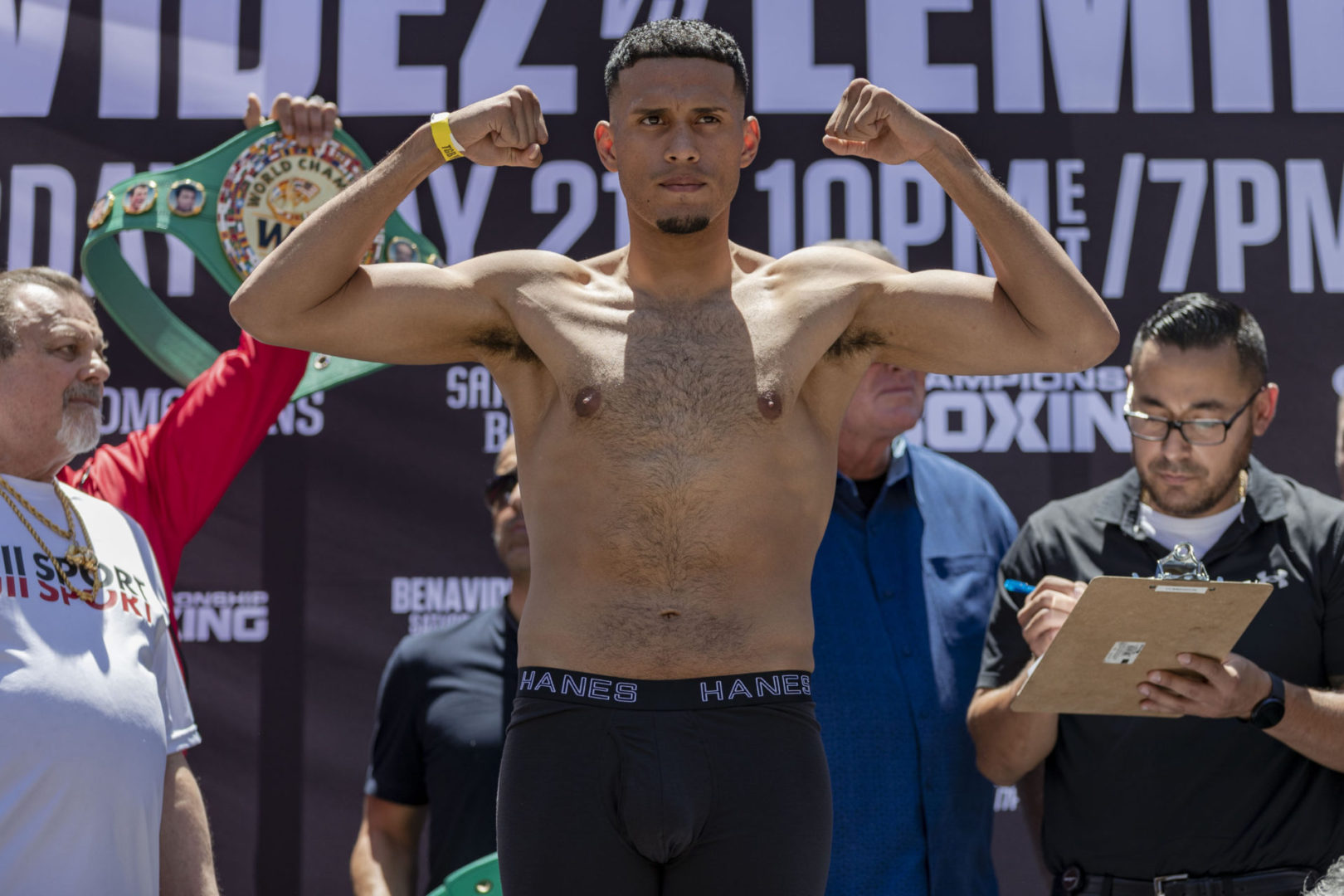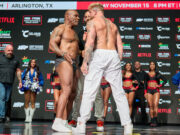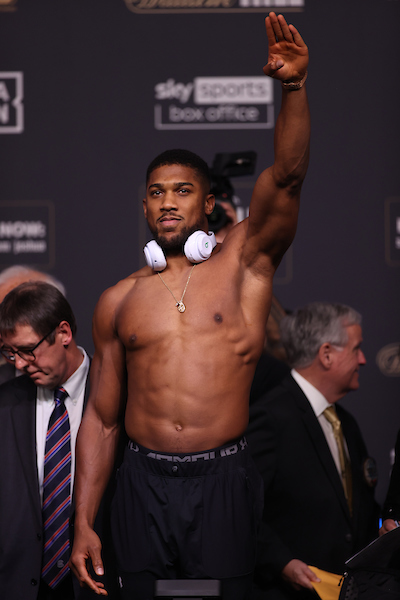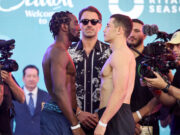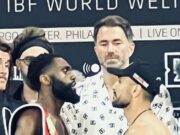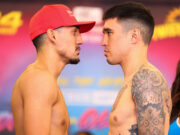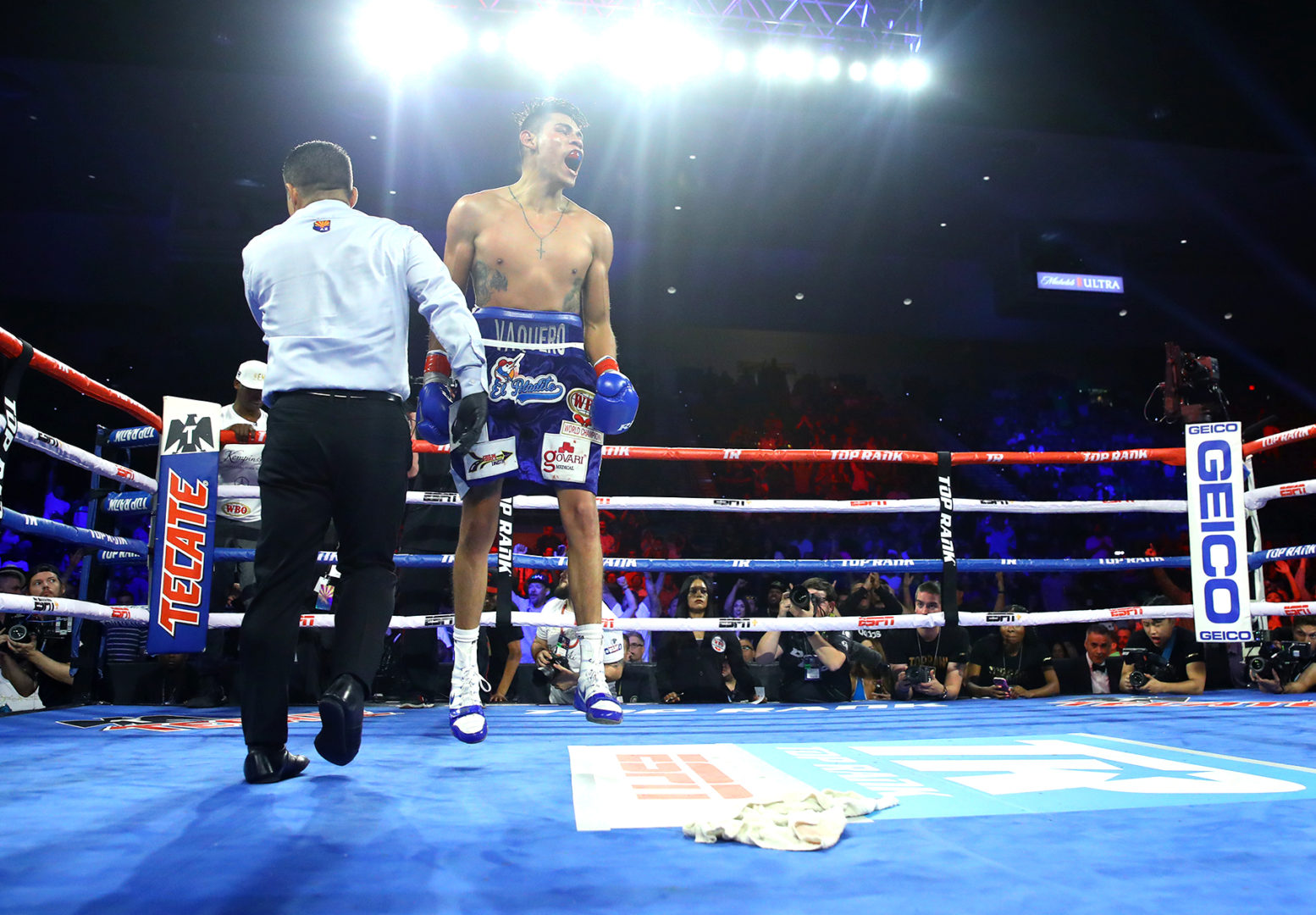By Bart Barry-
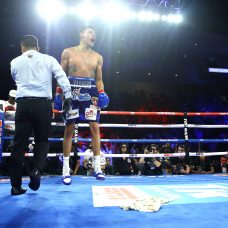
Saturday in the comain of an ESPN broadcast from Tucson, Mexican super bantamweight Emanuel Navarrete successfully defended his WBO world title by stopping former WBO super bantamweight titlist Isaac Dogboe in a pretty savage way. Both men were the same men only moreso in their rematch.
There’s something more disquieting about a volume-puncher’s demise, more decisive, something fated like a log being fed in a woodchipper. He rarely has much more than a plan A1 or A2; if plan A was shift-right-throw-left, plan A1 is shift-left-throw-right or jab-jab-hook instead of jab-hook; his primary attack, which is his defense, too, is reliant near entirely on an assertion of will, on a career-defining assumption he can continue longer than his more-talented peers. And the peers are near always more talented because who that had reflexes enough would get hit often as the volume-puncher, and who that had power enough would require such volume? Because the volume-puncher needs hundreds of repetitions to turn his trick he relies, too, on a signature rhythm, and woe betide the volume-puncher whose rhythm gets solved by an opponent.
Since Joe Frazier’s sainted name got invoked in a proper context during Saturday’s broadcast, his case is one worth visiting. He’d not a prayer against George Foreman because volume-punchers haven’t a prayer against true sluggers, and Foreman truly was one. Frazier’d much better than a prayer against Muhammad Ali, a boxer for most intents and purposes, because Frazier’s hit-you-everywhere-at-all-times attack offended Ali’s sensibilities much as his chin. Then came the 14th round of their third fight, their 41st round together (15+12+14 because their 1974 rematch was a 12-round affair for less than the real title), and Ali solved Frazier’s rhythm and movement. And heavyweight prizefighting’s greatest trilogy folded into a vicious target practice trainer Eddie Futch mercifully stopped with a singularly elegant gesture.
No fighter more needs protection from himself than a volume-puncher, as champion-cum-broadcaster Timothy Bradley should and did know. Beneath commentator Joe Tessitore’s hysteria and Andre Ward’s cerebral detachment a close listener heard Bradley’s empathetic fury with how poorly Dogboe’s corner protected its charge and son. Bradley knew well as anyone in the city of Tucson how hopeless was Dogboe’s strategy and how helpless Dogboe was to relent. Bradley, beaten semiconscious for at least half a fight by Ruslan Provodnikov and caught hung over his front knee more than a few times by Manny Pacquiao, registered early and often Dogboe’s masochistic pleas for an uppercut from Navarrete.
Whatever Bradley said, here’s what he silently willed from ringside: Isaac, before you make one more forward step, take your right glove, set it palm-down, and lodge it between your chin and throat, damn it! Dogboe didn’t have this standard maneuver in his quiver because his father proved more conditioning-coach prophet than boxing trainer, and because Dogboe’s title run was too entangled with his father’s proselytizing and NeHo chanting to permit Dogboe seek wisdom elsewhere.
However universal be certain elements of our beloved sport – like: catch the uppercut with an open palm set under your chin – there are others that might should bring pause from a Western pundit like: What in the Sam Hill do I know about the father-son dynamic shared by Ghanaian émigrés to London? And before anyone takes to his hind legs to bray about universal truths, he should ask how many supposedly universal expressions of a father’s love permit a world-title run in prizefighting.
Which leaves us where exactly? It leaves us wondering if Dogboe’s dad should be exiled for malpractice as at least a third of Saturday’s broadcast team insisted, or if perhaps Saturday’s fight got stopped at the right moment.
(Here’s a confession that addresses conviction: I googled “Dogboe hospitalized” immediately after writing that sentence, to ensure it wasn’t already an empirically dumb thought.)
However long looked the odds of a Dogboe comeback eight rounds through Saturday’s comain, they were shorter still than the odds of a 5-foot-2 man from Ghana making $100,000 for 35 minutes of work as a professional athlete in Arizona.
Time and again we return to the ‘t’ in each of life’s algorithms; if you start observation’s stopwatch at the opening bell of a rematch with Emanuel Navarrete, the Mexican who outclassed your son but five months ago, Paul Dogboe looks a sadistic ignoramus for allowing his son enter Saturday’s championship rounds, but what if you start that same stopwatch on his son’s birthday in 1994? If nothing else, you weigh the catalog of theretofore-unbelievable things your son did to bring himself to his rematch for a super bantamweight world title 24 years later. And under that weight, probably, you honor initially his petition to continue fighting.
Let none of the weight of those words diminish in any way Navarrete’s accomplishment. Twice he entered a title fight as its b-side and twice he prevailed, and the second time more prevalently than the first. That makes him the right kind of titlist, and that makes him increasingly unique among his peers. Navarrete did not doubt even momentarily his place in a ring across from Dogboe, wherever his promoter or his promoter’s broadcast partner’s interests lay.
Navarrete was the much larger man and better boxer, and he acted like it, broken right hand or otherwise. He knew Dogboe’s need to make a vacuum of the ring that suffocated any initiative but his own, and he snatched the initiative from Dogboe and did not relinquish it. Brutal as the fight was for Dogboe, it was not gentle on Navarrete, though you’d hardly have guessed it by watching the Mexican.
Aficionados got afforded a tiny peek under Navarrete’s professionalism and decency the moment he dropped Dogboe on the canvas in round 12. Navarrete’s glance at his unmanned foe was conclusive to the edge of contemptuous. Such a glance should delight aficionados about Navarrete’s prospects as champion.
Bart Barry can be reached via Twitter @bartbarry



